- Home
- H. Beam Piper
Little Fuzzy
Little Fuzzy Read online
LITTLE FUZZY
by
H. Beam Piper
I
Jack Holloway found himself squinting, the orange sun full in his eyes. Heraised a hand to push his hat forward, then lowered it to the controls toalter the pulse rate of the contragravity-field generators and lift themanipulator another hundred feet. For a moment he sat, puffing on theshort pipe that had yellowed the corners of his white mustache, and lookeddown at the red rag tied to a bush against the rock face of the gorge fivehundred yards away. He was smiling in anticipation.
"This'll be a good one," he told himself aloud, in the manner of men whohave long been their own and only company. "I want to see this one go up."
He always did. He could remember at least a thousand blast-shots he hadfired back along the years and on more planets than he could name at themoment, including a few thermonuclears, but they were all different andthey were always something to watch, even a little one like this. Flippingthe switch, his thumb found the discharger button and sent out a radioimpulse; the red rag vanished in an upsurge of smoke and dust that mountedout of the gorge and turned to copper when the sunlight touched it. Thebig manipulator, weightless on contragravity, rocked gently; fallingdebris pelted the trees and splashed in the little stream.
He waited till the machine stabilized, then glided it down to where he hadripped a gash in the cliff with the charge of cataclysmite. Good shot:brought down a lot of sandstone, cracked the vein of flint and hadn'tthrown it around too much. A lot of big slabs were loose. Extending theforward claw-arms, he pulled and tugged, and then used the undersidegrapples to pick up a chunk and drop it on the flat ground between thecliff and the stream. He dropped another chunk on it, breaking both ofthem, and then another and another, until he had all he could work overthe rest of the day. Then he set down, got the toolbox and thelong-handled contragravity lifter, and climbed to the ground where heopened the box, put on gloves and an eyescreen and got out a microrayscanner and a vibrohammer.
The first chunk he cracked off had nothing in it; the scanner gave theuninterrupted pattern of homogenous structure. Picking it up with thelifter, he swung it and threw it into the stream. On the fifteenth chunk,he got an interruption pattern that told him that a sunstone--orsomething, probably something--was inside.
Some fifty million years ago, when the planet that had been calledZarathustra (for the last twenty-five million) was young, there hadexisted a marine life form, something like a jellyfish. As these died,they had sunk into the sea-bottom ooze; sand had covered the ooze andpressed it tighter and tighter, until it had become glassy flint, and theentombed jellyfish little beans of dense stone. Some of them, by someancient biochemical quirk, were intensely thermofluorescent; worn as gems,they glowed from the wearer's body heat.
On Terra or Baldur or Freya or Ishtar, a single cut of polished sunstonewas worth a small fortune. Even here, they brought respectable prices fromthe Zarathustra Company's gem buyers. Keeping his point of expectationsafely low, he got a smaller vibrohammer from the toolbox and beganchipping cautiously around the foreign object, until the flint split openand revealed a smooth yellow ellipsoid, half an inch long.
"Worth a thousand sols--if it's worth anything," he commented. A deft taphere, another there, and the yellow bean came loose from the flint.Picking it up, he rubbed it between gloved palms. "I don't think it is."He rubbed harder, then held it against the hot bowl of his pipe. It stilldidn't respond. He dropped it. "Another jellyfish that didn't live right."
Behind him, something moved in the brush with a dry rustling. He droppedthe loose glove from his right hand and turned, reaching toward his hip.Then he saw what had made the noise--a hard-shelled thing a foot inlength, with twelve legs, long antennae and two pairs of clawed mandibles.He stopped and picked up a shard of flint, throwing it with an oath.Another damned infernal land-prawn.
He detested land-prawns. They were horrible things, which, of course,wasn't their fault. More to the point, they were destructive. They gotinto things at camp; they would try to eat anything. They crawled intomachinery, possibly finding the lubrication tasty, and caused jams. Theycut into electric insulation. And they got into his bedding, and bit, orrather pinched, painfully. Nobody loved a land-prawn, not even anotherland-prawn.
This one dodged the thrown flint, scuttled off a few feet and turned,waving its antennae in what looked like derision. Jack reached for his hipagain, then checked the motion. Pistol cartridges cost like crazy; theyweren't to be wasted in fits of childish pique. Then he reflected that nocartridge fired at a target is really wasted, and that he hadn't done anyshooting recently. Stooping again, he picked up another stone and tossedit a foot short and to the left of the prawn. As soon as it was out of hisfingers, his hand went for the butt of the long automatic. It was out andthe safety off before the flint landed; as the prawn fled, he fired fromthe hip. The quasi-crustacean disintegrated. He nodded pleasantly.
"Ol' man Holloway's still hitting things he shoots at."
Was a time, not so long ago, when he took his abilities for granted. Nowhe was getting old enough to have to verify them. He thumbed on the safetyand holstered the pistol, then picked up the glove and put it on again.
Never saw so blasted many land-prawns as this summer. They'd been bad lastyear, but nothing like this. Even the oldtimers who'd been on Zarathustrasince the first colonization said so. There'd be some simple explanation,of course; something that would amaze him at his own obtuseness for nothaving seen it at once. Maybe the abnormally dry weather had something todo with it. Or increase of something they ate, or decrease of naturalenemies.
He'd heard that land-prawns had no natural enemies; he questioned that.Something killed them. He'd seen crushed prawn shells, some of them closeto his camp. Maybe stamped on by something with hoofs, and then pickedclean by insects. He'd ask Ben Rainsford; Ben ought to know.
Half an hour later, the scanner gave him another interruption pattern. Helaid it aside and took up the small vibrohammer. This time it was a largebean, light pink in color, He separated it from its matrix of flint andrubbed it, and instantly it began glowing.
"Ahhh! This is something like it, now!"
He rubbed harder; warmed further on his pipe bowl, it fairly blazed.Better than a thousand sols, he told himself. Good color, too. Getting hisgloves off, he drew out the little leather bag from under his shirt,loosening the drawstrings by which it hung around his neck. There were adozen and a half stones inside, all bright as live coals. He looked atthem for a moment, and dropped the new sunstone in among them, chucklinghappily.
* * * * *
Victor Grego, listening to his own recorded voice, rubbed the sunstone onhis left finger with the heel of his right palm and watched it brighten.There was, he noticed, a boastful ring to his voice--not the suave,unemphatic tone considered proper on a message-tape. Well, if anybodywondered why, when they played that tape off six months from now inJohannesburg on Terra, they could look in the cargo holds of the ship thathad brought it across five hundred light-years of space. Ingots of goldand platinum and gadolinium. Furs and biochemicals and brandy. Perfumesthat defied synthetic imitation; hardwoods no plastic could copy. Spices.And the steel coffer full of sunstones. Almost all luxury goods, the onlyreally dependable commodities in interstellar trade.
And he had spoken of other things. Veldbeest meat, up seven per cent fromlast month, twenty per cent from last year, still in demand on a dozenplanets unable to produce Terran-type foodstuffs. Grain, leather, lumber.And he had added a dozen more items to the lengthening list of whatZarathustra could now produce in adequate quantities and no longer neededto import. Not fishhooks and boot buckles, either--blasting explosives andpropellants, contragravity-field generator parts, power tools,pharm
aceuticals, synthetic textiles. The Company didn't need to carryZarathustra any more; Zarathustra could carry the Company, and itself.
Fifteen years ago, when the Zarathustra Company had sent him here, therehad been a cluster of log and prefab huts beside an improvised landingfield, almost exactly where this skyscraper now stood. Today, Mallorysportwas a city of seventy thousand; in all, the planet had a population ofnearly a million, and it was still growing. There were steel mills andchemical plants and reaction plants and machine works. They produced alltheir own fissionables, and had recently begun to export a little refinedplutonium; they had even started producing collapsium shielding.
The recorded voice stopped. He ran back the spool, set for sixty-speed,and transmitted it to the radio office. In twenty minutes, a copy would beaboard the ship that would hyper out for Terra that night. While he wasfinishing, his communication screen buzzed.
"Dr. Kellogg's screening you, Mr. Grego," the girl in the outside officetold him.
He nodded. Her hands moved, and she vanished in a polychromatic explosion;when it cleared, the chief of the Division of Scientific Study andResearch was looking out of the screen instead. Looking slightly upward atthe showback over his own screen, Victor was getting his warm,sympathetic, sincere and slightly too toothy smile on straight.
"Hello, Leonard. Everything going all right?"
It either was and Leonard Kellogg wanted more credit than he deserved orit wasn't and he was trying to get somebody else blamed for it beforeanybody could blame him.
"Good afternoon, Victor." Just the right shade of deference about usingthe first name--big wheel to bigger wheel. "Has Nick Emmert been talkingto you about the Big Blackwater project today?"
Nick was the Federation's resident-general; on Zarathustra he was, to allintents and purposes, the Terran Federation Government. He was also alarge stockholder in the chartered Zarathustra Company.
"No. Is he likely to?"
"Well, I wondered, Victor. He was on my screen just now. He says there'ssome adverse talk about the effect on the rainfall in the Piedmont area ofBeta Continent. He was worried about it."
"Well, it would affect the rainfall. After all, we drained half a millionsquare miles of swamp, and the prevailing winds are from the west. There'dbe less atmospheric moisture to the east of it. Who's talking adverselyabout it, and what worries Nick?"
"Well, Nick's afraid of the effect on public opinion on Terra. You knowhow strong conservation sentiment is; everybody's very much opposed to anysort of destructive exploitation."
"Good Lord! The man doesn't call the creation of five hundred thousandsquare miles of new farmland destructive exploitation, does he?"
"Well, no, Nick doesn't call it that; of course not. But he's concernedabout some garbled story getting to Terra about our upsetting theecological balance and causing droughts. Fact is, I'm rather concernedmyself."
He knew what was worrying both of them. Emmert was afraid the FederationColonial Office would blame him for drawing fire on them from theconservationists. Kellogg was afraid he'd be blamed for not predicting theeffects before his division endorsed the project. As a division chief, hehad advanced as far as he would in the Company hierarchy; now he was on aRed Queen's racetrack, running like hell to stay in the same place.
"The rainfall's dropped ten per cent from last year, and fifteen per centfrom the year before that," Kellogg was saying. "And some non-Companypeople have gotten hold of it, and so had Interworld News. Why, even someof my people are talking about ecological side-effects. You know what willhappen when a story like that gets back to Terra. The conservationfanatics will get hold of it, and the Company'll be criticized."
That would hurt Leonard. He identified himself with the Company. It wassomething bigger and more powerful than he was, like God.
Victor Grego identified the Company with himself. It was something big andpowerful, like a vehicle, and he was at the controls.
"Leonard, a little criticism won't hurt the Company," he said. "Not whereit matters, on the dividends. I'm afraid you're too sensitive tocriticism. Where did Emmert get this story anyhow? From your people?"
"No, absolutely not, Victor. That's what worries him. It was this manRainsford who started it."
"Rainsford?"
"Dr. Bennett Rainsford, the naturalist. Institute of Zeno-Sciences. Inever trusted any of those people; they always poke their noses intothings, and the Institute always reports their findings to the ColonialOffice."
"I know who you mean now; little fellow with red whiskers, always looks asthough he'd been sleeping in his clothes. Why, of course the Zeno-Sciencespeople poke their noses into things, and of course they report theirfindings to the government." He was beginning to lose patience. "I don'tsee what all this is about, Leonard. This man Rainsford just made aroutine observation of meteorological effects. I suggest you have yourmeteorologists check it, and if it's correct pass it on to the newsservices along with your other scientific findings."
"Nick Emmert thinks Rainsford is a Federation undercover agent."
That made him laugh. Of course there were undercover agents onZarathustra, hundreds of them. The Company had people here checking onhim; he knew and accepted that. So did the big stockholders, likeInterstellar Explorations and the Banking Cartel and Terra Baldur-MardukSpacelines. Nick Emmert had his corps of spies and stool pigeons, and theTerran Federation had people here watching both him and Emmert. Rainsfordcould be a Federation agent--a roving naturalist would have a wonderfulcover occupation. But this Big Blackwater business was so utterly silly.Nick Emmert had too much graft on his conscience; it was too bad thatoverloaded consciences couldn't blow fuses.
"Suppose he is, Leonard. What could he report on us? We are a charteredcompany, and we have an excellent legal department, which keeps us safelyinside our charter. It is a very liberal charter, too. This is a Class-IIIuninhabited planet; the Company owns the whole thing outright. We can doanything we want as long as we don't violate colonial law or theFederation Constitution. As long as we don't do that, Nick Emmert hasn'tanything to worry about. Now forget this whole damned business, Leonard!"He was beginning to speak sharply, and Kellogg was looking hurt. "I knowyou were concerned about injurious reports getting back to Terra, and thatwas quite commendable, but...."
By the time he got through, Kellogg was happy again. Victor blanked thescreen, leaned back in his chair and began laughing. In a moment, thescreen buzzed again. When he snapped it on, his screen-girl said:
"Mr. Henry Stenson's on, Mr. Grego."
"Well, put him on." He caught himself just before adding that it would bea welcome change to talk to somebody with sense.
The face that appeared was elderly and thin; the mouth was tight, andthere were squint-wrinkles at the corners of the eyes.
"Well, Mr. Stenson. Good of you to call. How are you?"
"Very well, thank you. And you?" When he also admitted to good health, thecaller continued: "How is the globe running? Still in synchronization?"
Victor looked across the office at his most prized possession, the bigglobe of Zarathustra that Henry Stenson had built for him, supported sixfeet from the floor on its own contragravity unit, spotlighted in orangeto represent the KO sun, its two satellites circling about it as itrevolved slowly.
"The globe itself is keeping perfect time, and Darius is all right, Xerxesis a few seconds of longitude ahead of true position."
"That's dreadful, Mr. Grego!" Stenson was deeply shocked. "I must adjustthat the first thing tomorrow. I should have called to check on it longago, but you know how it is. So many things to do, and so little time."
"I find the same trouble myself, Mr. Stenson." They chatted for a while,and then Stenson apologized for taking up so much of Mr. Grego's valuabletime. What he meant was that his own time, just as valuable to him, waswasting. After the screen blanked, Grego sat looking at it for a moment,wishing he had a hundred men like Henry Stenson in his own organization.Just men with Stenson's brains and character; wishing
for a hundredinstrument makers with Stenson's skills would have been unreasonable, evenfor wishing. There was only one Henry Stenson, just as there had been onlyone Antonio Stradivari. Why a man like that worked in a little shop on afrontier planet like Zarathustra....
Then he looked, pridefully, at the globe. Alpha Continent had moved slowlyto the right, with the little speck that represented Mallorysporttwinkling in the orange light. Darius, the inner moon, where theTerra-Baldur-Marduk Spacelines had their leased terminal, was almostdirectly over it, and the other moon, Xerxes, was edging into sight.Xerxes was the one thing about Zarathustra that the Company didn't own;the Terran Federation had retained that as a naval base. It was the onereminder that there was something bigger and more powerful than theCompany.
* * * * *
Gerd van Riebeek saw Ruth Ortheris leave the escalator, step aside andstand looking around the cocktail lounge. He set his glass, with its inchof tepid highball, on the bar; when her eyes shifted in his direction, hewaved to her, saw her brighten and wave back and then went to meet her.She gave him a quick kiss on the cheek, dodged when he reached for her andtook his arm.
"Drink before we eat?" he asked.
"Oh, Lord, yes! I've just about had it for today."
He guided her toward one of the bartending machines, inserted his creditkey, and put a four-portion jug under the spout, dialing the cocktail theyalways had when they drank together. As he did, he noticed what she waswearing: short black jacket, lavender neckerchief, light gray skirt. Nother usual vacation get-up.
"School department drag you back?" he asked as the jug filled.
"Juvenile court." She got a couple of glasses from the shelf under themachine as he picked up the jug. "A fifteen-year-old burglar."
They found a table at the rear of the room, out of the worst of thecocktail-hour uproar. As soon as he filled her glass, she drank half ofit, then lit a cigarette.
"Junktown?" he asked.
She nodded. "Only twenty-five years since this planet was discovered, andwe have slums already. I was over there most of the afternoon, with a pairof city police." She didn't seem to want to talk about it. "What were youdoing today?"
"Ruth, you ought to ask Doc Mallin to drop in on Leonard Kellogg sometime,and give him an unobstusive going over."
"You haven't been having trouble with him again?" she asked anxiously.
He made a face, and then tasted his drink. "It's trouble just being aroundthat character. Ruth, to use one of those expressions your professiondeplores, Len Kellogg is just plain nuts!" He drank some more of hiscocktail and helped himself to one of her cigarettes. "Here," hecontinued, after lighting it. "A couple of days ago, he told me he'd beengetting inquiries about this plague of land-prawns they're having over onBeta. He wanted me to set up a research project to find out why and whatto do about it."
"Well?"
"I did. I made two screen calls, and then I wrote a report and sent it upto him. That was where I jerked my trigger; I ought to have taken a coupleof weeks and made a real production out of it."
"What did you tell him?"
"The facts. The limiting factor on land-prawn increase is the weather. Theeggs hatch underground and the immature prawns dig their way out in thespring. If there's been a lot of rain, most of them drown in their holesor as soon as they emerge. According to growth rings on trees, last springwas the driest in the Beta Piedmont in centuries, so most of themsurvived, and as they're parthenogenetic females, they all laid eggs. Thisspring, it was even drier, so now they have land prawns all over centralBeta. And I don't know that anything can be done about them."
"Well, did he think you were just guessing?"
He shook his head in exasperation. "I don't know what he thinks. You'rethe psychologist, you try to figure it. I sent him that report yesterdaymorning. He seemed quite satisfied with it at the time. Today, just afternoon, he sent for me and told me it wouldn't do at all. Tried to insistthat the rainfall on Beta had been normal. That was silly; I referred himto his meteorologists and climatologists, where I'd gotten my information.He complained that the news services were after him for an explanation. Itold him I'd given him the only explanation there was. He said he simplycouldn't use it. There had to be some other explanation."
"If you don't like the facts, you ignore them, and if you need facts,dream up some you do like," she said. "That's typical rejection ofreality. Not psychotic, not even psychoneurotic. But certainly not sane."She had finished her first drink and was sipping slowly at her second."You know, this is interesting. Does he have some theory that woulddisqualify yours?"
"Not that I know of. I got the impression that he just didn't want thesubject of rainfall on Beta discussed at all."
"That is odd. Has anything else peculiar been happening over on Betalately?"
"No. Not that I know of," he repeated. "Of course, that swamp-drainageproject over there was what caused the dry weather, last year and thisyear, but I don't see...." His own glass was empty, and when he tilted thejug over it, a few drops trickled out. He looked at his watch. "Think wecould have another cocktail before dinner?" he asked.

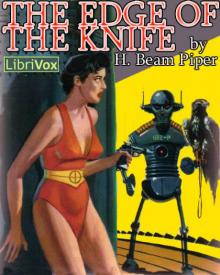 The Edge of the Knife
The Edge of the Knife Genesis
Genesis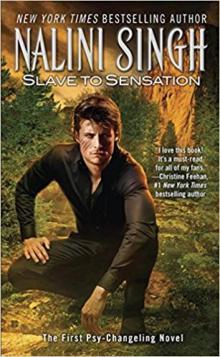 A Slave is a Slave
A Slave is a Slave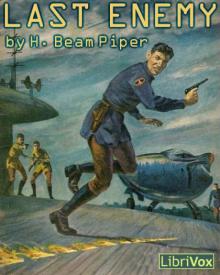 Last Enemy
Last Enemy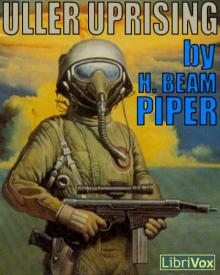 Uller Uprising
Uller Uprising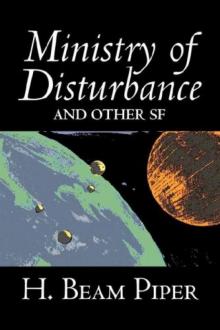 Ministry of Disturbance
Ministry of Disturbance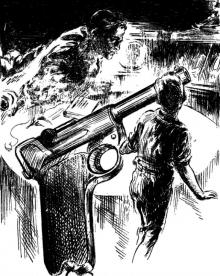 Time and Time Again
Time and Time Again The Mercenaries
The Mercenaries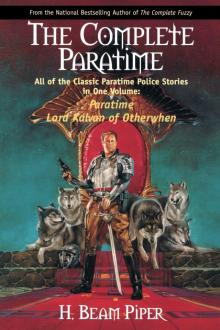 Police Operation
Police Operation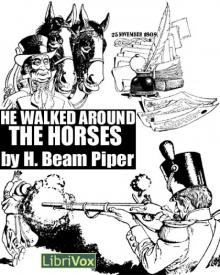 He Walked Around the Horses
He Walked Around the Horses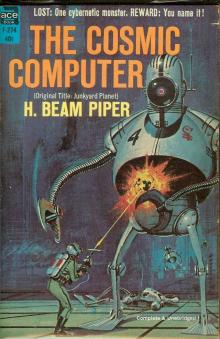 Time Crime
Time Crime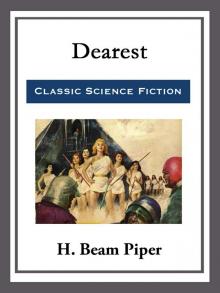 Dearest
Dearest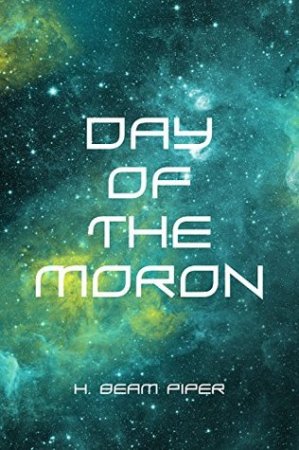 Day of the Moron
Day of the Moron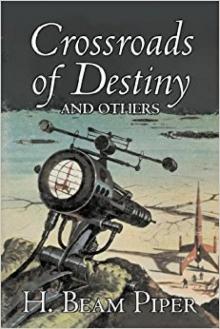 Crossroads of Destiny
Crossroads of Destiny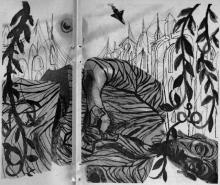 Graveyard of Dreams
Graveyard of Dreams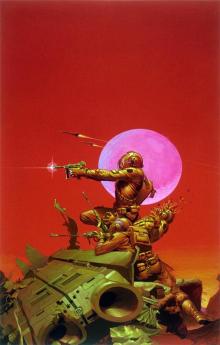 The Cosmic Computer
The Cosmic Computer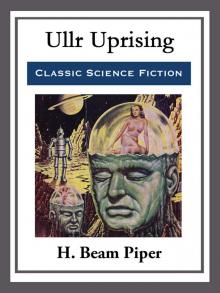 Ullr Uprising
Ullr Uprising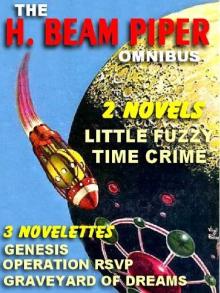 Operation R.S.V.P.
Operation R.S.V.P.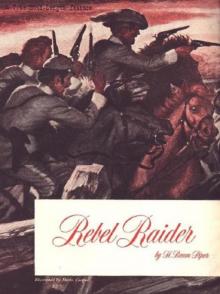 Rebel Raider
Rebel Raider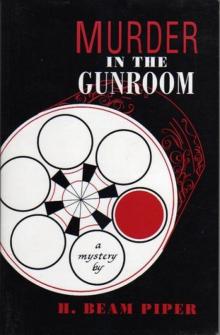 Murder in the Gunroom
Murder in the Gunroom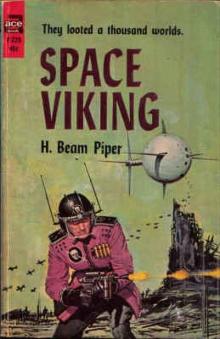 Space Viking
Space Viking The Answer
The Answer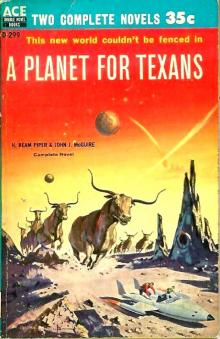 A Planet for Texans (aka Lone Star Planet)
A Planet for Texans (aka Lone Star Planet)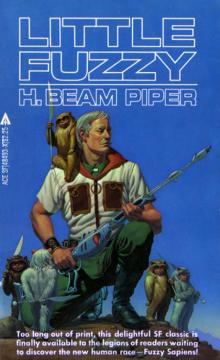 Little Fuzzy
Little Fuzzy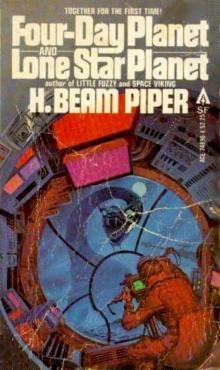 Four-Day Planet
Four-Day Planet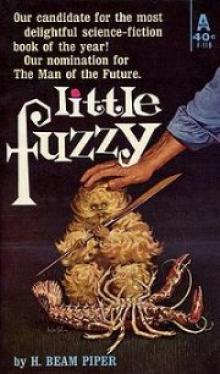 Little Fuzzy f-1
Little Fuzzy f-1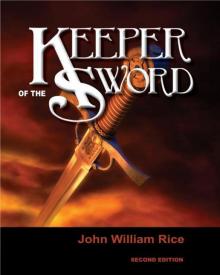 Keeper
Keeper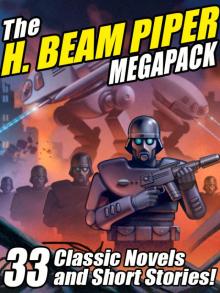 The H. Beam Piper Megapack
The H. Beam Piper Megapack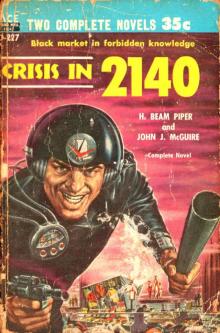 H. Beam Piper
H. Beam Piper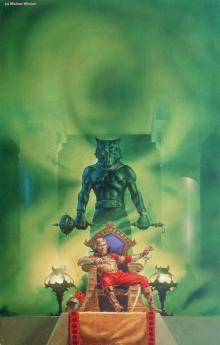 Lord Kalvan of Otherwhen
Lord Kalvan of Otherwhen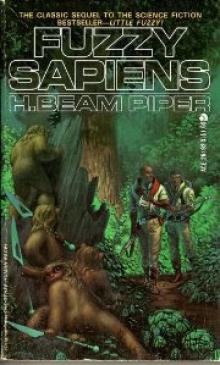 Fuzzy Sapiens f-2
Fuzzy Sapiens f-2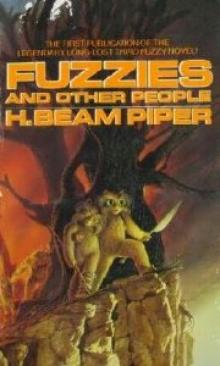 Fuzzies and Other People f-3
Fuzzies and Other People f-3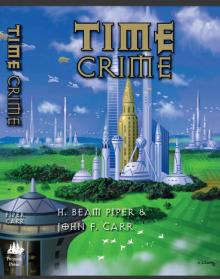 TIME PRIME
TIME PRIME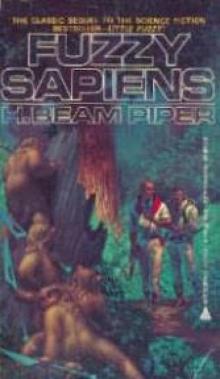 Fuzzy Sapiens
Fuzzy Sapiens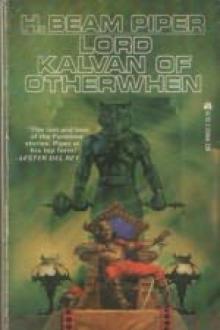 Lord Kalvan of Otherwhen k-1
Lord Kalvan of Otherwhen k-1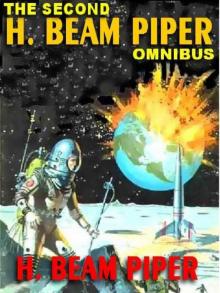 The Second H. Beam Piper Omnibus
The Second H. Beam Piper Omnibus